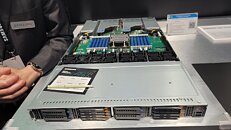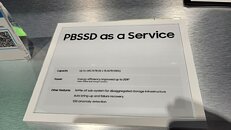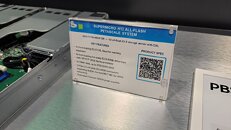T0@st
News Editor
- Joined
- Mar 7, 2023
- Messages
- 2,897 (3.77/day)
- Location
- South East, UK
| System Name | The TPU Typewriter |
|---|---|
| Processor | AMD Ryzen 5 5600 (non-X) |
| Motherboard | GIGABYTE B550M DS3H Micro ATX |
| Cooling | DeepCool AS500 |
| Memory | Kingston Fury Renegade RGB 32 GB (2 x 16 GB) DDR4-3600 CL16 |
| Video Card(s) | PowerColor Radeon RX 7800 XT 16 GB Hellhound OC |
| Storage | Samsung 980 Pro 1 TB M.2-2280 PCIe 4.0 X4 NVME SSD |
| Display(s) | Lenovo Legion Y27q-20 27" QHD IPS monitor |
| Case | GameMax Spark M-ATX (re-badged Jonsbo D30) |
| Audio Device(s) | FiiO K7 Desktop DAC/Amp + Philips Fidelio X3 headphones, or ARTTI T10 Planar IEMs |
| Power Supply | ADATA XPG CORE Reactor 650 W 80+ Gold ATX |
| Mouse | Roccat Kone Pro Air |
| Keyboard | Cooler Master MasterKeys Pro L |
| Software | Windows 10 64-bit Home Edition |
Leaked Samsung PBSSD presentation material popped up online a couple of days prior to the kick-off day of NVIDIA's GTC 2024 conference (March 18)—reports (at the time) jumped on the potential introduction of a "petabyte (PB)-level SSD solution," alongside an enterprise subscription service for the US market. Tom's Hardware took the time to investigate this matter—in-person—on the showroom floor up in San Jose, California. It turns out that interpretations of pre-event information were slightly off—according to on-site investigations: "despite the name, PBSSD is not a petabyte-scale solid-state drive (Samsung's highest-capacity drive can store circa 240 TB), but rather a 'petascale' storage system that can scale-out all-flash storage capacity to petabytes."
Samsung showcased a Supermicro Petascale server design, but a lone unit is nowhere near capable of providing a petabyte of storage—the Tom's Hardware reporter found out that the demonstration model housed: "sixteen 15.36 TB SSDs, so for now the whole 1U unit can only pack up to 245.76 TB of 3D NAND storage (which is pretty far from a petabyte), so four of such units will be needed to store a petabyte of data." Company representatives also had another Supermicro product at their booth: "(an) H13 all-flash petascale system with CXL support that can house eight E3.S SSDs (with) four front-loading E3.S CXL bays for memory expansion."


Tom's Hardware reckons that Supermicro could be using an "ultra-low-loss printed circuit board" within the H13 system: "(the manufacturer) claims its machine does not use PCIe Gen 5 retimers, which are typically required for these connections." The innovative PCB design: "allows it to fit into PCIe specifications concerning signal loss."


Samsung clarified that their "PBSSD as a Service" model is not intended to compete with mainstay storage providers (e.g. AWS, Google, Microsoft Azure, etc.). Tom's Hardware found out that the South Korean giant has positioned: "its PBSSD product as a solution for managed service providers (MSPs), cloud service providers, and end-users with their own datacenters or with their racks in colocated datacenters. The company will deliver hardware at a monthly fee, enabling Samsung's clients to offer affordable high-performance storage services to various companies." Samsung will commit to providing security and maintenance "to end users and some colocations." Samsung likely requires a bit more time to iron out all of the details—some clients may enjoy doing their own DIY.
View at TechPowerUp Main Site | Source
Samsung showcased a Supermicro Petascale server design, but a lone unit is nowhere near capable of providing a petabyte of storage—the Tom's Hardware reporter found out that the demonstration model housed: "sixteen 15.36 TB SSDs, so for now the whole 1U unit can only pack up to 245.76 TB of 3D NAND storage (which is pretty far from a petabyte), so four of such units will be needed to store a petabyte of data." Company representatives also had another Supermicro product at their booth: "(an) H13 all-flash petascale system with CXL support that can house eight E3.S SSDs (with) four front-loading E3.S CXL bays for memory expansion."


Tom's Hardware reckons that Supermicro could be using an "ultra-low-loss printed circuit board" within the H13 system: "(the manufacturer) claims its machine does not use PCIe Gen 5 retimers, which are typically required for these connections." The innovative PCB design: "allows it to fit into PCIe specifications concerning signal loss."


Samsung clarified that their "PBSSD as a Service" model is not intended to compete with mainstay storage providers (e.g. AWS, Google, Microsoft Azure, etc.). Tom's Hardware found out that the South Korean giant has positioned: "its PBSSD product as a solution for managed service providers (MSPs), cloud service providers, and end-users with their own datacenters or with their racks in colocated datacenters. The company will deliver hardware at a monthly fee, enabling Samsung's clients to offer affordable high-performance storage services to various companies." Samsung will commit to providing security and maintenance "to end users and some colocations." Samsung likely requires a bit more time to iron out all of the details—some clients may enjoy doing their own DIY.
View at TechPowerUp Main Site | Source


